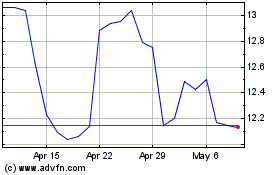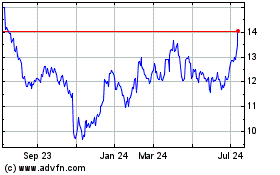Ford Investigating Process for U.S. Emissions Certification -- Update
February 21 2019 - 8:02PM
Dow Jones News
By Mike Colias and Stephen Nakrosis
Ford Motor Co. said Thursday that it would investigate its
process for certifying vehicles to meet U.S. fuel-economy
standards, after a group of employees raised concerns about the
company's testing methods.
The Dearborn, Mich., auto maker has alerted federal regulators
to its potential concerns, but the company hasn't determined
whether this would result in a revision of its fuel-economy
ratings, a Ford spokesman said.
Ford could face federal fines and legal action from customers if
its mileage ratings or emissions compliance are found to be faulty.
The spokesman declined to say how many vehicles would be affected
by the investigation.
The auto maker said it would work with regulators and outside
experts to evaluate the emissions-certification process, starting
with its recently launched 2019 Ford Ranger compact pickup, to be
followed by additional vehicles.
Ford in late October brought in an outside firm to look into
concerns raised by employees, the Ford spokesman said. The firm
submitted initial findings to Ford, which began an internal
investigation in December, he said. That led to the company to
communicate the issue to regulators this week.
In a statement Thursday, the Environmental Protection Agency
said Ford briefed the agency on the issue Wednesday. It said the
information Ford disclosed is "too incomplete for EPA to reach any
conclusions" and that it would work with the company as the
investigation unfolds.
The disclosure comes as Ford Chief Executive Jim Hackett tries
to reassure investors that a broad turnaround plan for the company
will start gaining traction this year. Mr. Hackett has been under
pressure to boost declining profits and articulate a long-term
growth strategy for the second-biggest U.S. auto maker by
sales.
Over the past decade, a number of large auto companies have
taken significant financial hits from fuel-economy and emissions
controversies, after either inflating their mileage ratings or
intentionally skirting laws governing tailpipe pollution.
The most notable was Volkswagen AG's disclosure in 2015 that it
installed so-called defeat devices on nearly 600,000 diesel-powered
vehicles to cheat on government emissions tests. The German car
maker in 2017 pleaded guilty to criminal charges in the U.S. and
has paid more than $20 billion in legal settlements and fines.
On Thursday, Ford said in a statement that "the investigation
and potential concerns don't involve the use of defeat devices in
our products."
Ford in 2014 lowered the mileage ratings on six models, mostly
hybrids and plug-in electric hybrids, after admitting to
overstating its vehicles' fuel economy. The company said the
overstatements resulted from errors conducted during
government-prescribed testing and that it would pay owners as much
as $1,050 to compensate for underestimating fuel costs.
In 2012, Kia Motors Corp. and its parent company Hyundai Motor
Co. admitted to having overstated fuel-efficiency ratings on about
1.2 million vehicles sold in the U.S. by 1 to 6 miles a gallon. The
South Korean auto makers, which blamed the inflated ratings on
testing errors, eventually agreed in 2014 to pay nearly $700
million in federal fines and class-action lawsuits.
Ford said it has hired an outside firm to conduct an
investigation into the so-called "vehicle road load specifications"
used in testing to certify emissions and fuel economy.
Vehicles usually are tested for emissions and fuel economy using
a machine called a dynamometer, which is stationary. Testers are
required to simulate so-called road load, or the effect of friction
from the tires and aerodynamic drag when the vehicle is moving.
Write to Mike Colias at Mike.Colias@wsj.com
(END) Dow Jones Newswires
February 21, 2019 19:47 ET (00:47 GMT)
Copyright (c) 2019 Dow Jones & Company, Inc.
Ford Motor (NYSE:F)
Historical Stock Chart
From Mar 2024 to Apr 2024

Ford Motor (NYSE:F)
Historical Stock Chart
From Apr 2023 to Apr 2024
